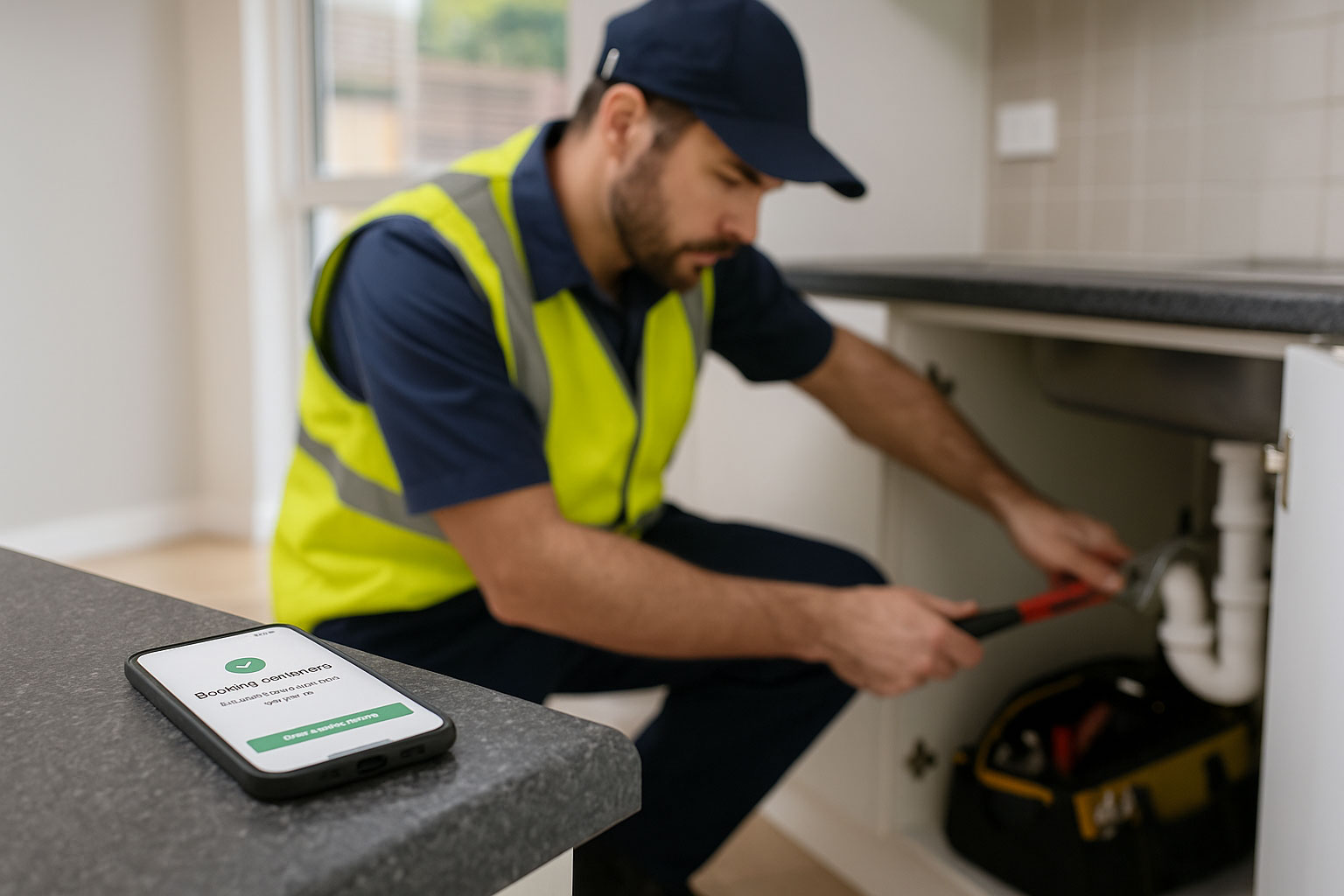
From Missed Calls to Booked Appointments for Home Services Trades
Tradespeople across Australia know how hard it is to balance being on the tools with running the business. Phones often ring while someone is halfway through fixing a pipe, rewiring a socket, or climbing a ladder. Those calls are easy to miss, but each one could be the start of a new job. Customers rarely leave voicemails, and most don’t wait for a call back; they move on to the next available tradesperson.
A missed call can quickly turn into a lost job, and for busy trades, those losses add up fast. This is where after-hours phone answering support becomes invaluable, ensuring that even when the tools are down or the day has ended, new opportunities are never missed.
The Cost of Missed Calls in Real Numbers
The impact of missed calls becomes clearer when the figures are written down. Imagine a tradesperson who gets ten new enquiries each week. If just three of those go unanswered, and the average job is worth $300, that’s nearly $1,000 lost in a single week. Over the course of a year, that adds up to tens of thousands of dollars that could have been earned.
- Missed calls per week × percentage likely to book × average job value = lost revenue.
This simple calculation helps business owners see just how much potential work is being left behind.
Why Missed Calls Damage More Than the Bottom Line
The financial loss is only one part of the problem. Missing a call leaves customers with the impression that a business is unreliable. Even if a tradesperson returns the call later, the customer may have already found someone else.
In urgent cases, such as burst pipes or electrical faults, the delay can be critical. Missing those jobs not only costs money in the short term but also damages trust and reduces the chance of repeat business.
What Customers Expect from Trades Today
Customers expect fast responses and clear communication. Technical ability is important, but so is the feeling that the tradesperson is dependable and available when needed.
Many issues arise outside of regular working hours, and being able to take calls in the evening or at weekends can make a tradesperson stand out from the competition. Those who can provide this level of responsiveness are more likely to build long-term customer loyalty.
Setting Up Call Support for Trades
When tradespeople use a call answering service, the setup process is straightforward. To ensure every call is handled correctly, the provider needs a few key details:
- Service areas covered
- Standard and after-hours working times
- Pricing notes such as call-out fees or minimum charges
- Types of jobs accepted or excluded
- Emergency contacts for urgent calls
By sharing this information at the start, calls can be managed in line with the way the tradesperson wants their business represented.
Turning Calls into Confirmed Bookings
A well-trained call handler does more than take a message. They secure the booking. This involves capturing the customer’s name, phone number, address, and details about the job.
They can also confirm call-out fees or deposits and check for any access issues, such as locked gates or pets. Most importantly, they offer a definite time slot. When customers receive that certainty, they stop looking for alternatives and commit to the booking.
Managing Urgent and Routine Jobs
Not every call is the same. Some are routine maintenance jobs, while others involve urgent hazards. Call handlers use clear rules to manage both. Routine jobs are scheduled at the next available time, while urgent calls such as gas leaks, electrical faults, or burst water mains are escalated immediately.
Life-threatening situations are directed to emergency services. This structure helps keep customers safe and ensures tradespeople are alerted quickly when it matters most.
Smarter Scheduling
Managing a diary is more than just filling slots. Travel time between jobs needs to be considered, and allowances must be made for overruns. Shared calendars allow call handlers to see availability in real time and prevent double-bookings.
Service windows can also be offered instead of fixed times, which adds flexibility for both the customer and the tradesperson. This approach reduces wasted time and keeps the day running smoothly.
Handling Peaks and After-Hours Calls
Trades often face spikes in demand during storms, heatwaves, or long weekends. Customers want fast reassurance in those moments. A call answering team can update greetings to reflect the situation, route overflow calls to additional handlers, and manage expectations about waiting times. This helps businesses stay calm under pressure and maintain a professional image, even when call volumes surge.
Reducing No-Shows and Cancellations
Missed appointments waste time and money. One of the simplest ways to cut down on no-shows is to send reminders. Call handlers can arrange SMS or email confirmations immediately after a booking and follow up with reminders the day before or on the morning of the job.
For high-value work, deposits or cancellation policies can also be set. These measures encourage customers to keep their appointments and protect the tradesperson’s schedule.
Beyond the Phone: Turning Every Enquiry into a Job
Not all customers pick up the phone these days. Some prefer to use SMS, messaging apps, or online enquiry forms. A good system ensures these channels are monitored and that every message becomes a booking.
Even a missed call can trigger a quick text back, giving the tradesperson a second chance to secure the job. By treating all enquiries as opportunities, trades can capture more work without extra effort.
Keeping a Consistent Business Voice
Customers should always feel like they’re dealing directly with the tradesperson, even if someone else is taking the call. Call handlers use agreed scripts that include the business name and greeting in the same way the tradesperson would use them.
Training ensures that local suburb names are pronounced correctly, and quality checks, such as call recordings, help maintain these standards. This gives customers a consistent and professional experience.
Tracking the Numbers That Matter
To see whether the system is working, trades need to keep an eye on a few simple measures:
- Percentage of calls answered
- Percentage of calls turned into bookings
- Jobs by suburb or postcode
- Number of repeat customers
- Revenue generated per booked job
Reviewing these figures on a weekly basis makes it easier to spot trends and identify areas for improvement.
Privacy and Customer Information
Customer details such as names, phone numbers, and addresses must be kept secure. If calls are recorded, customers should be told. Payment details should never be transmitted over unsecured channels.
By following these practices, tradespeople can meet Australian privacy requirements and reassure customers that their information is being handled responsibly.
Staying in Touch After the Job
The end of a job is also the beginning of the next opportunity. Call handlers can arrange follow-up reminders for maintenance, send requests for reviews, or note special details for the next visit.
This kind of aftercare helps build long-term relationships and increases the chance of repeat work. Customers who feel remembered are more likely to return and to recommend the tradesperson to others.
FAQ’s
Q1: How quickly are calls usually answered?
A1: Most calls are picked up within a few rings, far faster than a tradesperson could manage while working.
Q2: Can appointments be added directly into my own calendar?
A2: Yes, bookings can be entered straight into shared calendars so availability is always up to date.
Q3: Is this suitable for solo trades as well as larger teams?
A3: Yes. Sole operators benefit from never missing a call, and larger teams gain consistency across multiple jobs.
Q4: What happens if two customers call at the same time?
A4: Multiple handlers can take calls at once, so no customer is left waiting.
Q5: Can pricing notes and call-out fees be shared with customers?
A5: Yes, call handlers can confirm details provided by the tradesperson to avoid confusion.



